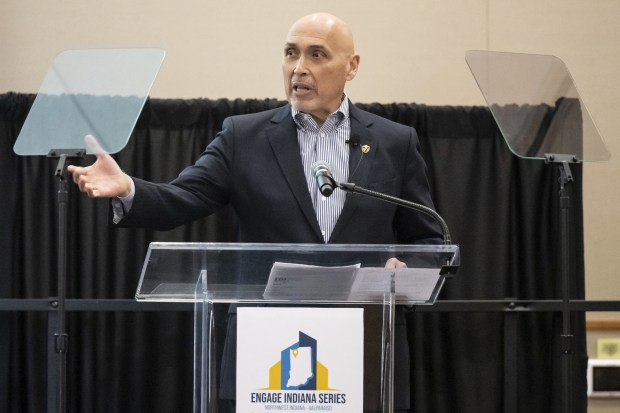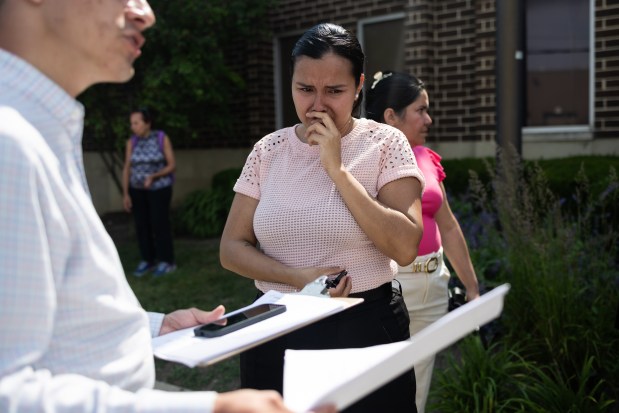Valparaiso University announced Friday it is considering cuts in undergraduate and graduate programs with low enrollment that include some foreign language majors, theology, music and cybersecurity, among other areas of study, and the potential for limited faculty cuts.
Any programs that are discontinued would be phased out through the end of the 2026-27 school year, allowing currently enrolled students to complete their majors, with a decision by the start of the August fall semester, according to a statement to the campus from Eric Johnson, the university’s provost and executive vice president for academic affairs.
“These are important decisions, and the University takes them seriously. The programs were identified after careful examination of several factors, first and foremost low current enrollment and enrollment trends,” Johnson said in the campus announcement.
Valparaiso University President Jose Padilla speaks during the “Engage Indiana” event at Valparaiso University on Tuesday, April 25, 2023. (Kyle Telechan for the Post-Tribune)
The department changes are being considered as part of the university’s updated strategic plan, released in the fall of 2022 by President José Padilla. The university has faced a host of challenges over the past several years, including declining enrollment and the closure of its law school.
The university also dropped its theater major, along with several others, because of low enrollment in those programs a few years ago.
During an online campus town hall last month, Johnson said he noted that data collected over the past six months shows that the university has “too many majors, minors, and graduate programs for the number of students and faculty that we have.
‘We must address this issue if we are to build on Valpo’s long tradition of excellence, strengthen our financial foundation, and continue to provide our students with the best possible college experience.”
Undergraduate programs being considered include German and Spanish majors; bachelor of music; astronomy major and minor; theology major and minor; and the economics and computer analysis major.
Graduate programs include cybersecurity; digital media; sports media; English studies and communication; nurse educator; and public health.
Possible outcomes for the departments after further evaluation include programs continuing with changes; development of a cooperative program, through a merger with other departments; or a discontinuation, Johnson said.
Not all programs that go through the process may be eliminated, and discontinuing a program does not mean the university will not continue to teach courses in that area, Johnson said, adding required general education courses and other elective courses will still be taught based on student demand.
Programs with enrollment under the median of all programs — 25 students — that are not put into the discontinuance process will be given an improvement plan to work on over the next two years and then be re-evaluated.
“In addition, starting this fall, we will initiate a continuous improvement process through which all academic programs will perform an annual analysis using a common set of metrics, and will receive and collaborate on recommendations to implement program modifications moving forward,” he said.
If all of the programs under consideration are cut, Johnson said, around 3% of the current student body could be impacted.
Not all program changes or eliminations will cause faculty reductions and the potential impact on faculty positions is expected to be “very limited,” Johnson said. “Unfortunately, we do anticipate a limited reduction of faculty positions in some departments, after the discontinuance process is completed and following any necessary teach out” as the number of students in those departments dwindles.
Going forward, Johnson said the university will be considering and implementing new programming, including a master’s in social work that will be offered for the first time in the fall.





